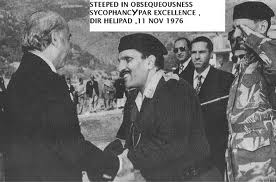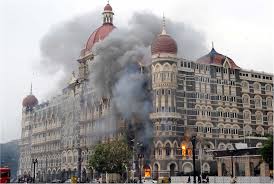 जनरल कयानी के रिटायरमेंट का समय आ गया है . पाकिस्तान को नया सेनाध्यक्ष चुनना है . वैसे तो यह पाकिस्तान का अंदरूनी मामला है परन्तु मेरा यह मानना है की यह भारत के लिए सतर्क रहने का समय है . जैसे पुराने समय मैं अकबर जैसे रा जा को भी अपने को गाजी सिद्ध करने के लिए हिन्दुओं का कतल करना पड़ता था ऐसे ही पूर्व आई एस आई अध्यक्ष जनरल कयानी का मुबई ह्त्या काण्ड मैं संलिप्त होना एक प्रबल संभावना है .यह उन्हें गाजी होने की परिक्षा पास करने जैसा था . मुशर्रफ ने कारगिल पर हमला कर यह परिक्षा पास की थी .
जनरल कयानी के रिटायरमेंट का समय आ गया है . पाकिस्तान को नया सेनाध्यक्ष चुनना है . वैसे तो यह पाकिस्तान का अंदरूनी मामला है परन्तु मेरा यह मानना है की यह भारत के लिए सतर्क रहने का समय है . जैसे पुराने समय मैं अकबर जैसे रा जा को भी अपने को गाजी सिद्ध करने के लिए हिन्दुओं का कतल करना पड़ता था ऐसे ही पूर्व आई एस आई अध्यक्ष जनरल कयानी का मुबई ह्त्या काण्ड मैं संलिप्त होना एक प्रबल संभावना है .यह उन्हें गाजी होने की परिक्षा पास करने जैसा था . मुशर्रफ ने कारगिल पर हमला कर यह परिक्षा पास की थी .
प्रश्न है की नए सेनाध्यक्ष को कौन सी परिक्षा पास करनी होगी . जो भी होगी भारत विरोधी ही होगी क्योंकि मुस्लिम उम्मा मैं अफगानिस्तान पर परीक्षा पास नहीं की जा सकती. जनरल कयानी जैसे सीनियर व् प्रतिष्ठित जनरल के बाद अपनी पहचान बनाने के लिए कोई बहुत खतरनाक खेल ही खेलना होगा .
भारत को सतर्क रहने की बहुत आवश्यकता है .
 http://india.blogs.nytimes.com/2013/11/04/what-will-a-new-army-chief-mean-for-pakistan-and-the-neighborhood/?ref=world&_r=0
http://india.blogs.nytimes.com/2013/11/04/what-will-a-new-army-chief-mean-for-pakistan-and-the-neighborhood/?ref=world&_r=0
नीचे का लेख पढ़ें
What Will a New Army Chief Mean for Pakistan and the Neighborhood ?
By SHUJA NAWAZ Evan Vucci/Pool, via ReutersJohn Kerry, center, U.S. secretary of state, with Hamid Karzai, left, president of Afghanistan, and Gen. Ashfaq Parvez Kayani, Pakistani army chief, after a meeting in Brussels, Belgium, on Apr. 24.
Evan Vucci/Pool, via ReutersJohn Kerry, center, U.S. secretary of state, with Hamid Karzai, left, president of Afghanistan, and Gen. Ashfaq Parvez Kayani, Pakistani army chief, after a meeting in Brussels, Belgium, on Apr. 24.Since it was announced last month that Pakistan’s army chief, Gen. Ashfaq Parvez Kayani, would be retiring, Prime Minister Nawaz Sharif has kept the country dangling on his choice, creating a new parlor game for the chattering classes in the process. General Kayani has been characteristically mum, except for an unusual press release that said he was leaving the office on Nov. 29, without closing out other options, even as he accepted the concurrent role of chairman of the Joint Chiefs of Staff.
Mr. Sharif could begin consolidating his power by making an early and firm choice to replace General Kayani. Explaining the reason behind the choice would end speculation about the process. Currently, the only certainty appears to be the fact that there will be a new army chief come the end of November 2013 and whoever gets the prime minister’s nod will be a changed person after that, for the office in many ways makes the man.
The top five in order of seniority all are highly trained professionals, each with certain proven qualities and different backgrounds. All except one are Punjabis, an unusual coincidence in a military that has a substantial Pakhtun presence and at a time when the army is fighting a war inside its borders in the Pakhtun territories.
The prime minister should be looking for a leader who will inspire the army’s rank and file, bruised by a seemingly never-ending conflict against their own countrymen. Someone who has war-fighting experience or has been part of the transformation of the Pakistan Army from a conventional army to one trained also for asymmetrical warfare. Someone who will not necessarily agree with the prime minister on everything but will be discreet in offering frank advice and let the prime minister make the policy decisions after that. Someone who will keep the army away from politics and not be a counterweight to civil power. Someone who will remain in the background and allow the transition to civilian supremacy occur over time.
General Kayani, who took over from Gen. Pervez Musharraf, was a soldier at heart. He immediately headed to the forward lines of the war inside the Federally Administered Tribal Areas and made many such trips to see and to be seen with his soldiers and officers who were fighting and dying in alarming numbers. Why didn’t General Musharraf make such trips? Why didn’t the civilian leadership also do the same? That mystery remains.
General Kayani also designated his first year as the Year of the Soldier and the second year of his first term to be the Year of Training. The latter was an uphill battle since an army at war has little time for training. He kept foreign relationships alive but played his cards close to his chest and surprised his American interlocutors by acting in what he perceived to be Pakistani interests, especially on the Afghan conflict. He also encouraged opening discussions with India on a broad range of issues, though his innate caution led him to tug back the government when it seemed to be moving too quickly on some fronts.
His decision in 2010 to accept the three-year extension that President Asif Ali Zardari offered left a question mark on his tenure since it created a sense of indispensability and broke the career trajectory of a number of deserving generals, one of whom would have succeeded him. One day, we hope he will share his thoughts on that process and the reason it happened.
By the time his second term ended, there was a huge gap between him and his newest corps commanders: some 16 courses at least at the Pakistan Military Academy; a lifetime in military circles. This gap was similar to the ones that faced General Mohammad Zia ul-Haq and General Musharraf earlier. It creates a negative dynamic, not just by making collegial decision-making difficult between such a senior chief and his corps commanders but also by stunting independent thinking as group think takes root in an organization that is colored by one man’s thought processes and preferences over time. Such a situation creates a culture where a request for comments is often marked by many a “Yes” and some “Of course!”
During his tenure, General Kayani tried to alter the outlook of the army on the true enemy of the nation. His speech at the Pakistan Military Academy on Aug. 14, 2012, reflected his views and was seen as a shift away from what was called an Indo-centric view to fighting a war within Pakistan:
The war against extremism and terrorism is not only the army’s war, but that of the whole nation. We as a nation must stand united against this threat. The army’s success is dependent on the will and support of the people.
Under General Kayani, the new army doctrine finally came out, and though written in the opaque hybridized language of academia and the military –an odd combination — for the first time, it spoke of Pakistan facing a “multifaceted threat.” Instead of naming India as the only threat to Pakistan, it talked of multiple threats and tried to focus attention on the internal war being fought by the Pakistan Army.
For some reason, General Kayani chose not to pursue that tack in his public utterances, allowing the civilian government to open dialogue with India on a host of issues, including trade, but demanding that progress needed to be on a broad front. His approach seemed to be “all or nothing at all.” This effectively put the brakes on any breakthrough between the two countries, given the weak coalition government of the Peoples Party on the one hand and the weak coalition led by Prime Minister Manmohan Singh in India.
 Sang Tan/Associated PressNawaz Sharif, prime minister of Pakistan, listening to a speech at the 9th World Islamic Economic Forum in London, United Kingdom, on Oct. 29.
Sang Tan/Associated PressNawaz Sharif, prime minister of Pakistan, listening to a speech at the 9th World Islamic Economic Forum in London, United Kingdom, on Oct. 29.Mr. Sharif allowed that drift to continue. General Kayani’s offer to demilitarize Siachen Glacier after the April 2012 avalanche killed 140 Pakistani soldiers and civilians met with a brusque rebuff by India and provoked a bitter debate inside India on why it needed to protect that frozen wasteland from Pakistan and potentially China. The flare-up of firings across the Line of Control in Kashmir in 2013 added to a growing mistrust between India and Pakistan.
A thoughtful man, who read whenever he had the time, General Kayani was an unusual autodidact, quite unlike his predecessor, who was not known to read much and relied mainly on oral briefings and conversations to formulate his views. General Kayani used private conversations to test his ideas but only after reading up on the subject matter. He believed strongly in his ability to present a logic and structure to his ideas, although it is unclear how effective that was in changing minds of his interlocutors, especially in the White House.
There, his unsolicited and unusual presentation of his white paper on the pitfalls facing the American strategy in Afghanistan and Pakistan’s role in that situation met a cool reception after he handed the document over directly to President Obama. One American official harshly characterized the paper as “sophomoric.” Yet, President Obama, who also relies on academic and logical frameworks for his own presentations, may have found some use in the paper, which opened a window into General Kayani’s thinking. Whether General Kayani changed any minds in Washington remains an open question.
General Kayani’s abiding legacy will remain one of a general who resisted the temptation to directly intervene in politics, choosing instead to stay in the shadows – not surprising, given his background as former head of the Inter-Services Intelligence directorate, and despite the call to intervene from many in the political system. For that, he will be remembered kindly.
Prime Minister Sharif’s choice of the new army chief will help define his third tenure. He has selected four army chiefs in the past, some of whom viscerally shunned politics but found themselves at odds with all for different reasons. One, Gen. Asif Nawaz, died in office in 1993; another, Gen. Abdul Waheed, persuaded Mr. Sharif and then-President Ghulam Ishaq Khan to resign simultaneously in 1993. A third, Gen. Jehangir Karamat, resigned in 1996. The fourth, General Musharraf, upended Mr. Sharif’s government in 1999 after the Kargil War debacle and after Mr. Sharif sought American help to end that conflict with India.
The prime minister will have another shot at naming an army chief three years hence, if he completes his own five-year term. In that sense, the choice this month is important to continue the trajectory of civilian control of the military and must be matched by civilian competence and responsibility. If all this were to happen and Mr. Sharif selects the professional of his choosing and two consecutive military transitions occur on his watch, without any extensions or back-room deals, Mr. Sharif will have put his stamp on governance, and Pakistan wins.
Shuja Nawaz is director of the South Asia Center at the Atlantic Council in Washington D.C. and is author of “Crossed Swords: Pakistan, Its Army, and the Wars Within.”
